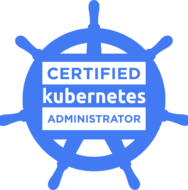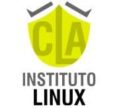Certified Kubernetes Administrator (CKA)

El programa que te gradúa como Certified Kubernetes Administrator (CKA) fue creado por la Linux Foundation y la Cloud Native Computing Foundation (CNCF) como parte de un esfuerzo continuo para ayudar a desarrollar el ecosistema de Kubernetes. Dado que se trata de uno de los proyectos de código abierto de mayor velocidad, el uso de Kubernetes está en la parte más alta de la cúspide.
Datos Importantes
Tanto el curso como el examen de kubernetes están en inglés.
La certificación como Certified Kubernetes Administrator (CKA) de la Linux Foundation se halla en la modalidad «A tu propio ritmo» (eliges tus horarios y días de estudio).
Tienes hasta un año para hacer el curso de la Linux Foundation y para rendir la prueba..
El costo del CURSO + el VOUCHER para el examen de certificación tiene un precio de 575 dólares.
Para nuestros alumnos, tenemos cupones de descuento que les permiten adquirir el CURSO + el VOUCHER a precios preferenciales.
Además, nosotros apoyamos de forma decidida el proceso de certificación de nuestros alumnos, ofreciendoles, de forma paralela, material educativo que apoye el buen rendimiento de su examen.
Método de pago: Tarjeta de crédito. En cualquiera de los caso, el pago se hace directamente a la Linux Foundation (en su página web).
Este es el detalle del programa de estudios del curso de la Linux Foundation para certificar como Certified Kubernetes Administrator (CKA)
Chapter 1. Course Introduction
Chapter 2. Basics of Kubernetes
Chapter 3. Installation and Configuration
Chapter 4. Kubernetes Architecture
Chapter 5. APIs and Access
Chapter 6. OPI Objects
Chapter 7. Managing State with Deployments
Chapter 8. Services
Chapter 9. Volumes and Data
Chapter 10. Ingress
Chapter 11. Scheduling
Chapter 12. Logging and Troubleshooting
Chapter 13. Custom Resource Definitions
Chapter 14. Helm
Chapter 15. Security
Chapter 16. High Availability
Este es el detalle de los temarios que abarcará el examen de Certificación de la Linux Foundation para optar a la Certificación como Certified Kubernetes Administrator (CKA) .
The CKA Certification focuses on the skills required to be a successful Kubernetes Administrator in industry today.
The CKA Certification exam includes these general domains and their weights on the exam:
Application Lifecycle Management – 8%
Installation, Configuration & Validation – 12%
Core Concepts – 19%
Networking – 11%
Scheduling – 5%
Security – 12%
Cluster Maintenance – 11%
Logging / Monitoring – 5%
Storage – 7%
Troubleshooting – 10%
Application Lifecycle Management – 8%
Understand deployments and how to perform rolling update and rollbacks
Know various ways to configure applications
Know how to scale applications
Understand the primitives necessary to create a self-healing application
Installation, Configuration & Validation – 12%
Design a Kubernetes Cluster
Install Kubernetes Masters and Nodes
Configure secure cluster communications
Configure a highly-available Kubernetes cluster
Know where to get the Kubernetes release binaries
Provision underlying infrastructure to deploy a Kubernetes cluster
Choose a network solution
Choose your Kubernetes infrastructure configuration
Run end-to-end tests on your cluster
Analyze end-to-end test results
Run Node end-to-end Tests
Install and use kubeadm to install, configure, and manage Kubernetes clusters
Core Concepts – 19%
Understand the Kubernetes API primitives
Understand the Kubernetes cluster architecture
Understand Services and other network primitives
Networking – 11%
Understand the networking configuration on the cluster nodes
Understand Pod networking concepts
Understand Service Networking
Deploy and configure network load balancer
Know how to use Ingress rules
Know how to configure and use the cluster DNS
Understand CNI
Scheduling – 5%
Use label selectors to schedule Pods
Understand the role of DaemonSets
Understand how resource limits can affect Pod scheduling
Understand how to run multiple schedulers and how to configure Pods to use them
Manually schedule a pod without a scheduler
Display scheduler events
Security – 12%
Know how to configure authentication and authorization
Understand Kubernetes security primitives
Know how to configure network policies
Create and manage TLS certificates for cluster components
Work with images securely
Define security contexts
Secure persistent key value store
Cluster Maintenance – 11%
Understand Kubernetes cluster upgrade process
Facilitate operating system upgrades
Implement backup and restore methodologies
Logging / Monitoring – 5%
Understand how to monitor all cluster components
Understand how to monitor applications
Manage cluster component logs
Manage application logs
Storage – 7%
Understand persistent volumes and know how to create them
Understand access modes for volumes
Understand persistent volume claims primitive
Understand Kubernetes storage objects
Know how to configure applications with persistent storage
Troubleshooting – 10%
Troubleshoot application failure
Troubleshoot control plane failure
Troubleshoot worker node failure
Troubleshoot networking
Postula Aquí
Envíanos este formulario y formaliza tu postulación
